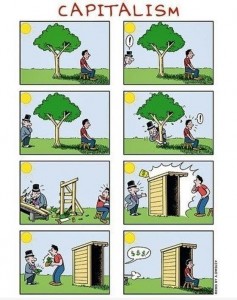There is no alternative to capitalism
Let us tell you a story of three men, Rohit and Rohan and Raj. Rohit lives in Socialnagar, has clothes to wear, food on his plate and all the resources in Socialnagar are owned by his government. There is no profit motive and everything is for social welfare. However, there is glaring inefficiency in how Socialnagar operates but the government is blind to it because it is the state’s money after all. The resources are not efficiently utilized, development is not high and the economy though not deprived, isn’t prosperous either.
Now, let us meet Rohan, who lives in Communagar. He lives in the set-up where everything is for promotion of equality in the community. All the resources are owned by the community as a whole and the motive is to make sure everyone gets an equal share of the pie. What is the end result? The pie on the whole is smaller. Rohan is smart and intelligent, yet he refuses to spend the time and energy to innovate, work hard and produce more because whatever he earns will be taken away from him and distributed equally among all other residents of Communagar anyway. The society has equity, but no innovation or prosperity as there is no notion of meritocracy.
Finally, let us meet Raj. He lives in Capitalnagar and has always worked hard for whatever he has achieved. His is a society of entrepreneurs and businessmen and all resources are privately owned. Innovation and meritocracy are rewarded and to be able to achieve a life more luxurious than someone else, you need to work towards it. He is not as smart as Rohit or Rohan, but has been able to achieve a standard of living better than both by sheer hard work and by the forces of supply and demand.
This in essence, summarizes our argument to say that there indeed is no alternative to capitalism.
The Merriam-Webster dictionary defines Capitalism as, “an economic system characterized by private or corporate ownership of capital goods, by investments that are determined by private decision, and by prices, production, and the distribution of goods that are determined mainly by competition in a free market”
Capitalism is a system that has co-evolved with humans to be the system that best fits our psychology and also best takes advantage of evolutionary dynamics. Humans inherently have a tendency to want more, want better than someone else for themselves and capitalism empowers them to do that. It provides people good incentives to work hard, think out of the box and come up with ideas that help improve the individual and in turn the society. The profit motive under capitalism that is often criticized as “greed” is in fact, the driving force behind ideas that make processes and society more efficient.
The father of Economics, Adam Smith, in his book, “Wealth of Nations”, points out that:
1. An Economic system works best if each person pursues his or her own self-interest, i.e., the greatest profit.
2. The profit motive drives economics. The only basis for making economic decisions should be what brings the greatest monetary profit.
3. In order to make economic decisions, everything must have a price. Money provides the measuring rod of economic value.
4. Decisions about whom to produce things for are determined by supply and demand, by income relative to others. Private wealth determines the distribution of goods and services.
5. Wealth is primarily private property that within certain legal limits, one can do with as one will.
Capitalism as a system is fair-it allows people to retain the seeds of their hard work, thereby motivating them to work even harder. The invisible hand of the market, i.e. the forces of supply and demand determines a person/organization’s profit. Products come and go because people create new market demand by identifying a new, more superior product to satisfy the needs of the people. Hence, it is a system which is primarily dependent on what the society needs and desires. It allows producers to produce different products and it allows consumers to “voluntarily” choose from the wide array of options available to them.
Capitalism has improved the material standards of living of the societies implementing it because one of the most powerful human drives, self-interest, is liberated from moral scorn by Capitalism. While community solidarity can evoke huge support in the short run, such experiments have not been successful in the long run historically. On the other hand, working for one’s own interest provides a powerful incentive to work-hard in the long run. Every economy has a host of decisions to be made about supply and demand of raw materials, labour, technology etc. These decisions, which may overwhelm a large centrally planned economy, are simplified by capitalism’s price mechanism which directs all the individual actors to heed only one variable, their own self-interest.
Traditionally, over several hundreds of years, the global economic system has had access to resources that were seemingly inexhaustible. It is the efficiency brought about by capitalism that brought to focus the fact that these resources are in fact, exhaustible and hence need to be used economically. It has encouraged continued technological innovation to ensure that these resources are used in the most efficient way and more and more substitutes have been found to replace them.
Much of today's awesome technology was not imagined even a decade ago. The best mechanism for realizing the infinite ingenuity of humankind is the market itself.
The following video by Prager University aptly supports our point: Why Capitalism Works
We must consider the record of market-oriented economies in delivering material well-being - in lifting living standards, broadening choice and allowing people to live longer, healthier lives. Nowhere has this record been more remarkable than in formerly centrally controlled economies. Market reforms adopted in China after 1978 and India after 1991 have lifted more people out of poverty in a short time span than any previous economic transformation in history.
In the end, capitalism is the only viable system we have for organizing our economy. It alone harnesses the reality of human nature - our continual striving for progress and our competitive instincts to do our best. It alone is compatible with political and democratic freedoms. And it alone has proven results - advances in material well-being over sustained periods, lifting hundreds of millions of our fellow humans out of grinding poverty.
Wouldn’t you want Rohit and Rohan to be able to harness their capability to the maximum? Wouldn't you want them to be a part of Capitalnagar as well?
Theme picture source: thebsreport.wordpress.com
Picture 1 source: vijayforvictory.com
Picture 2 source: http://abit.hr/how-to-fix-capitalism/
This post is a formal entry for the InsideIIM Debate, Battle #5
Team Name: Twisted Minds
Team Mate: Reshal Jain
Institute: IIM Lucknow
Read XLRI Jamshedpur's counterpunch to this argument here.


